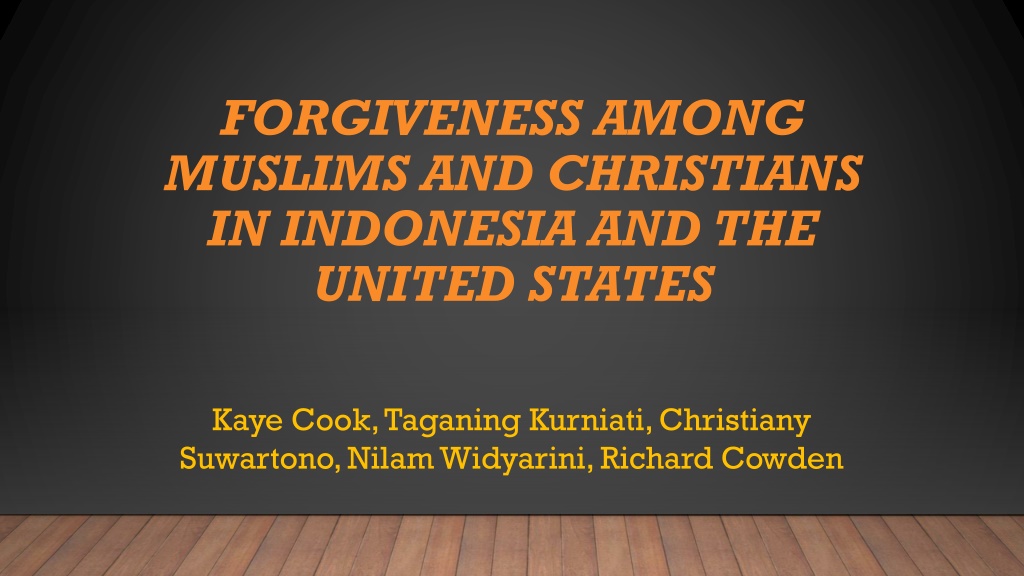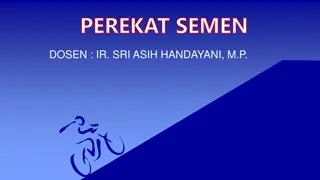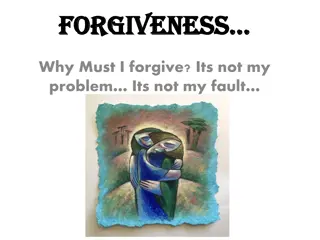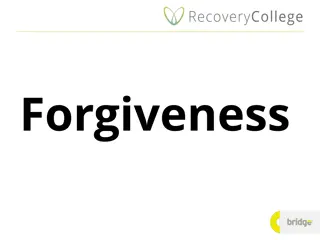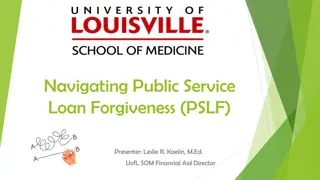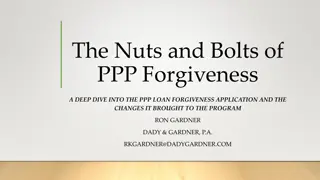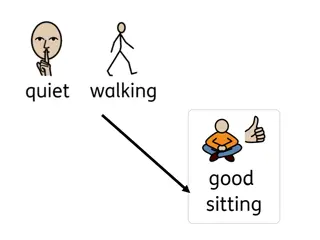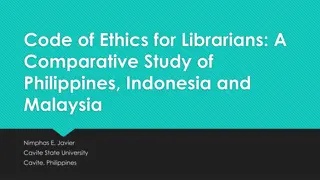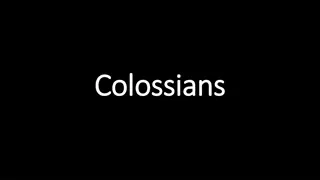Comparative Study of Forgiveness Among Muslims and Christians in Indonesia and the US
This research project aims to examine forgiveness attitudes among Muslims and Christians in Indonesia and the United States through online surveys. The study focuses on cultural and religious nuances in forgiveness perceptions and aims to contribute to the virtue literature by validating scales capturing cross-cultural and religious differences.
Download Presentation

Please find below an Image/Link to download the presentation.
The content on the website is provided AS IS for your information and personal use only. It may not be sold, licensed, or shared on other websites without obtaining consent from the author. Download presentation by click this link. If you encounter any issues during the download, it is possible that the publisher has removed the file from their server.
E N D
Presentation Transcript
FORGIVENESS AMONG MUSLIMS AND CHRISTIANS IN INDONESIA AND THE UNITED STATES Kaye Cook, Taganing Kurniati, Christiany Suwartono, Nilam Widyarini, Richard Cowden
OUR PURPOSE We proposed to administer in-person surveys which explored patterns of similarity and difference in forgiveness among Muslims and Christians in the US and Indonesia, cultures which are individualistic and collectivistic respectively. Our focus was on better understanding the attitudes to forgiveness among these two religious groups in these two countries. This remains our primary goal, with online rather than in-person surveys.
OVERVIEW OF THE LITERATURES TO WHICH WE HOPE TO CONTRIBUTE Our primary focus is the cross-cultural and cross-religious virtue literature. Until recently, the virtue literature has described forgiveness as a universal virtue. Recognizing the sense in which this is true, we nevertheless also identify and measure cultural and religious nuance. We hope to contribute to the larger virtue literature by our focus on understanding the attitudes to forgiveness among Muslims and Christians in the US and Indonesia. In particular, we will document cultural and religious differences, and use these to cross-culturally validate three scales which we have created. These scales were designed to capture cross- cultural difference. We will explore whether they do so and whether they capture religious differences as well.
ADDITIONAL LITERATURES Our work also contributes to the forgiveness literature. Many theoretical assumptions in the literature have not been explored across religions or cultures. We further contribute to the literature on measuring cultural differences by two scales that attempt to measure cultural difference: The Social Harmony Scale (developed by Dr. Kurniati, Kurniati et al., 2017) and the Cultural Motivations for Transgression Resolution Scale (developed by Dr. Cook, not yet published). The first scale measures cultural difference in terms of attitudes to social harmony; the second, in terms of attitudes to social harmony, social embeddedness, and social responsibility. We also contribute to the literature on harmonious living, as nurtured by forgiveness among individuals and groups. Pancasila is the official national motto of Indonesia, Bhineka Tunggal Ika (Unity in Diversity). The Pancasila scale, developed by Dr. Suwartono (Suwartono & Meinarno, 2012), measures five dimensions (spirituality, humanity, nationality, democracy, and social justice), all of which are relevant across cultures and religions.
OVERVIEW OF OUR DESIGN We have surveyed almost two thousand individuals online: We carried out a survey (n = 151, two wave) of Christians in the US, using SurveyMonkey A survey (n = 622, three wave) of Christians and Muslims in Indonesia, using SurveyMonkey. A survey of 600 Indonesians and 600 Americans, 600 Muslims and 600 Christians in each context, using Qualtrics.
RESEARCH QUESTIONS In the slides that follow, we report on multiple projects that have emerged from the data: 1. Can religion sustain well-being during times of disaster? 2. What is the role of decisional and emotional forgiveness in well-being in each country and, within Indonesia, each religion? 3. What is the importance of a Nation s Values, Resilience, and Self-Forgiveness in Reinforcing Forgiveness in Religiously Plural Communities? 4. What are the associations among suffering, mental health, and well-being? Longitudinal data among Indonesians during COVID-19 5. What do forgiveness events reveal about the values of individuals in Indonesia and the US?
STUDY 1. CAN RELIGION SUSTAIN WELL-BEING DURING TIMES OF DISASTER: EVIDENCE FROM A THREE-WAVE LONGITUDINAL STUDY IN INDONESIA The study was aimed to identify the role of religious commitment in sustaining well-being during the COVID-19 pandemic A three-wave longitudinal study (N = 617; n = 309 Muslims, n = 308 Christians) was conducted in Indonesia during the implementation of the stay-at-home orders, when the infection cases were increasing significantly Measurements Religious Commitment Inventory Well-Being Flourish Scale Trait Forgivingness Scale
STUDY 1: RESULTS AND CONCLUSION Results show that the religious commitment measured at the baseline predicts higher well- being levels over all the three-time points. Participants with higher religious commitment show consistently higher Happiness and Life Satisfaction, Physical and Mental Health, Meaning and Purpose, Character and Virtue, Close Social Relationship, and Well-being Flourish over three-time points in comparison to those who are less in religious commitment. The differences were maintained after forgivingness trait measured at baseline was controlled for. For both Muslims and Christians in a collectivistic culture, religious commitment helps to maintain well-being in a time of disaster (i.e., Covid-19) in which face-to-face support and gathering are restricted.
STUDY 2. DECISIONAL AND EMOTIONAL FORGIVENESS IN WELL-BEING AS MEASURED IN TWO CULTURES: OVERVIEW AND HYPOTHESES In this research, we use cross-sectional data from Christians in the US and Indonesia to explore multiple hypotheses: o Hypothesis 1: That the subscales of self and interpersonal forgiveness will capture differences across culture in the relationship of forgiveness with well-being, as measured by physical health, mental health, and close social relationships. o Hypothesis 2: Within self forgiveness, values reorientation and esteem restoration will predict differences in well-being by culture such that values reorientation correlates more highly with well- being in the US and esteem restoration, in Indonesia. o Hypothesis 3: Within interpersonal forgiveness, emotional and decisional state forgiveness will correlate with well-being, with decisional forgiveness more predictive of well-being in the US and emotional, in Indonesia. A follow-up paper will explore these predictions with regard to religion.
STUDY 2. MEASURES Covariates include: Trait Forgivingness Scale Intrinsic Religiousness Subscale of the New Indexes of Religious Orientation Scale Self-Forgiveness Dual Process Scale Decision to Forgive Scale Emotional Forgiveness Scale Well-Being Scale
STUDY 2. CONCLUSIONS. DO DECISIONAL AND EMOTIONAL FORGIVENESS IMPROVE WELL-BEING IN EACH OF TWO CULTURES? We confirm Hypothesis 1 (i.e., the usefulness of the currently available scales) and demonstrate the importance of studying forgiveness across cultures. Commonalities across cultures include the desire that the violator acknowledge their guilt and attempt to make reparations. With regard to self-forgiveness and Hypothesis 2, we found that both values reorientation and esteem restoration were important in well-being for Americans, but esteem restoration (and not values reorientation) were important for Indonesians. This is directly contrary to the literature and our expectations. We failed to support Hypothesis 3 with regard to interpersonal forgiveness. We found that a decision to forgive and emotional forgiveness predicted well-being for Americans but neither predicted well-being for Indonesians. The study has many strengths (i.e., its cross-cultural nature) and limitations (i.e., its cross-sectional design). We will soon have the data to examine relationships across religions and longitudinally.
STUDY 3. THE IMPORTANCE OF A NATIONS VALUES, RESILIENCE, AND SELF-FORGIVENESS IN REINFORCING FORGIVENESS IN RELIGIOUSLY PLURALISTIC COMMUNITIES Pancasila, the national philosophy of a country which seeks to promote unity among diversity in culture and religion, has five values which provide guidelines for citizens' daily life, encouraging people of various backgrounds to coexist harmoniously. However, in a pluralistic community, conflicts may arise as a result of intolerance. Forgiveness can serve as a powerful instrument to combat intolerance in the community. This research explores the factors associated with forgiveness, namely, the nation s values, self-forgiveness, and resilience, to better understand forgiveness. The total number of participants of this study is 622 participants; age 18 - 55 (M = 21.94, SD = 4.32). The regression testing results demonstrated that the whole model collectively had a significant influence on the decision to forgive. The largest contribution came from positive value reorientation, personal esteem restoration, and resiliency. Therefore, the results indicate that self-forgiveness and the tendency to effectively use coping strategies have helped people understand the importance and implementation of forgiveness. This study provides invaluable insight into the influencing virtue of forgiveness which indirectly plays an important role in creating harmony in pluralistic communities.
STUDY 4. WHAT ARE THE ASSOCIATIONS AMONG SUFFERING, MENTAL HEALTH, AND WELL-BEING? LONGITUDINAL DATA AMONG INDONESIANS DURING COVID-19 Research was carried out with Indonesian Muslims and Christians, with religion controlled for. Suffering has bidirectional associations with depression, anxiety, and flourishing. Suffering generally has a stronger effect on anxiety than on depression and flourishing, but not by much. Anxiety seems to have a stronger effect on suffering than depression or flourishing, but not by much. When specific domains of flourishing are considered, suffering does not really predict close social relationships and has a weak connection with character and virtue. The reverse is also true, such that character and virtue and close social relationships don't seem to predict suffering. Suffering is more strongly associated with mental health than physical health in both directions (this is kind of surprising because suffering is most widely examined in relation to pain/illness).
STUDY 5. WHAT DO FORGIVENESS EVENTS REVEAL ABOUT THE VALUES OF INDIVIDUALS IN INDONESIA AND THE US? In each survey, participants were asked to think of a time in the last month when you did something that was against your beliefs or values and to think of a situation in which who is close to you hurt you deeply. In these situations, someone violated your expectations or rules for relationships, and their actions may trigger the need for forgiveness. The first question thus asked for a self-forgiveness story and the second, for an interpersonal forgiveness story. We hypothesized that their stories would reveal cultural differences in values, consistent with their designation as individualistic or collectivistic cultures. Self forgiveness stories were coded for Justice or Care. Whereas justice stories articulated a principle or used words such as should , stories of care were those in which the participant described emotional concern for another. These expressions could be either positive (caring, loving, comforting) or negative (feeling guilty or regretting hurting, humiliating, making fun of, being harsh, or offending another). Interpersonal forgiveness stories were coded as dyadic or communal on the basis of the number of persons that offended the participant. In dyadic violations, one person offended the participant. The offender might have told others but if the participant didn t describe the others as having been involved, the event was coded dyadic . In communal violations, in describing the incident, the participant talks about more than one person s involvement (e.g., my parents, my friends, my roommates, my uncle and aunt s family).
STUDY 5. WHAT DO SELF-FORGIVENESS EVENTS REVEAL ABOUT THE VALUES OF INDIVIDUALS IN INDONESIA AND THE US? Because of their collectivistic nature, we hypothesized that Indonesians would express greater concern for care. We found no difference between the self-forgiveness stories and thus the values of Americans and Indonesians, when tested by Chi-Square Test. Demographics in the two groups were similar. Americans reported 34 instances of care (25%) and 102 instances of justice Indonesians reported 131 instances of care (24%) and 406 instances of justice. 10% of American stories and 14% of Indonesian stories could not be coded.
STUDY 5. WHAT DO INTERPERSONAL FORGIVENESS EVENTS REVEAL ABOUT THE VALUES OF INDIVIDUALS IN INDONESIA AND THE US? The contents of interpersonal forgiveness events for US (n = 151) and Indonesian (n = 622) participants were coded for the number of individuals implicated in the forgiveness event. Indonesians included larger groups in their descriptions, when the results were tested by Chi-Square, 2 = 125.67, p < .0001. Americans included more than one other person in 17 out of 145 instances of interpersonal violation (12%) Indonesians included more than one other person in 187 out of 523 instances (36%) 4% of American stories and 16% of Indonesian responses could not be coded
STUDY 5. CONCLUSIONS: WHAT ARE THE VALUES OF INDIVIDUALS IN INDONESIA AND THE US BASED ON THE SELF AND INTERPERSONAL FORGIVENESS STORIES THEY TELL? Although there were no differences in the self-forgiveness stories, when asked to tell stories when they had been hurt by another, Indonesians implicated a larger group of people their stories, most often, parents, extended family members, and friends. This difference is consistent with the description of Indonesians as collectivistic. These stories suggest that, when conducting cross-culture research into morality, moral events need to be examined with regard to the community of which the participants are a part.
ADDITIONAL PAPERS Cross-cultural validation of the Cultural Motivations for Transgression Resolution (CMTR) Scale, a scale that has emerged from interviews done in Indonesia.
